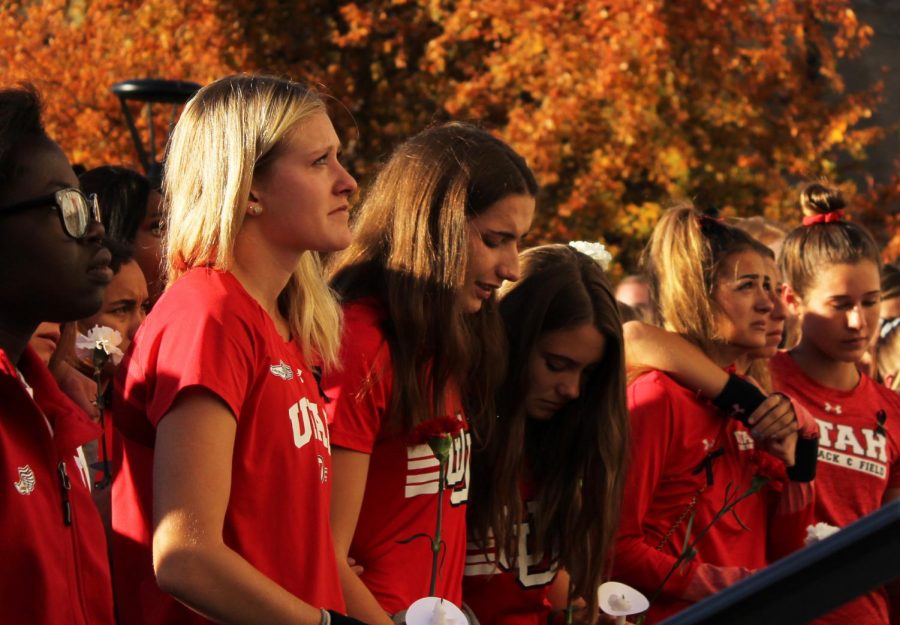Cushman: Utah Fails to Properly Address Sexual Violence
Students, staff, family and friends attend a vigil on the steps of the Park Building for Lauren McCluskey, who was tragically killed on campus at The University of Utah in Salt Lake City, Utah on Wednesday, Oct. 24, 2018. (Photo by Kiffer Creveling | The Daily Utah Chronicle)
December 29, 2019
Following the on-campus death of Lauren McCluskey just over a year ago, there has been an ongoing discussion about making the University of Utah campus safer. Proposed solutions include a new nighttime ride-share program, hiring a chief security officer and securing $1 million of funding for campus safety. Still, until Utah’s dangerous culture, dating violence and sexual assault are taken seriously, safety on campus will remain a problem.
A Chronic Problem
When lawmakers consider large societal problems in Utah, violence towards women has always played second fiddle. For example, the State Crime Lab in Utah receives roughly 120 rape kits each month and has a growing backlog of untested kits. In 2017, Utah lawmakers budgeted $1.2 million to hire nine technicians to help eliminate this backlog, but that was only half of the budget the Crime Lab requested in order to address the 1,900 untested rape kits. There are 1,900 women in Utah right now whose tests are waiting to be evaluated, and that backlog is still growing, even after the 2017 law expanding the budget of the Crime Lab.
While state lawmakers reveal a serious lack of urgency by neglecting to fund the Crime Lab effectively, a similar lack of leadership was demonstrated by the U when Lauren McCluskey was murdered despite multiple attempts to contact campus police. Further investigation uncovered severe carelessness given to cases of dating violence. Students have accused campus police of ignoring complaints, and the Salt Lake Tribune reported that officers altered or did not report domestic violence cases.
Destruction of the Rule of Law
Utah has seen lower crime rates over the last few years, but while overall crime rates are decreasing, the amount of sexual assault is trending upwards, with a 4.5% increase from 2017 to 2018. This made 2018 the fifth consecutive year that the number of sexual assaults in Utah increased. The number of rape kits sent to the Utah Crime Lab has increased by 535% over the last six years. Reported gropings on Utah campuses spiked in 2018, nearly tripling from the amount in 2015. The spike was the largest at the U, which also had the largest amount of overall reports. Reports also show that of the women who filled out one of the most recent safety surveys on campus, more than a quarter of them had been sexually assaulted, 80% of whom did not file a report. About 70% of the victims who responded said they did not report sexual assaults because they felt that it was not serious enough to file a formal complaint.
I firmly believe this spike in sexual assaults in Utah and its campuses can be attributed to the breakdown of the rule of law caused by the lack of gravity that dating violence and sexual assault cases are given. When certain crimes are not treated equally and justice is not pursued equally for all victims, the rule of law begins to deteriorate. Political scientists consider the inability to provide justice to be an attribute of a failing state but, in this case, is indicative of a state that discriminately fails to protect women.
Amy Lightfoot, Deputy Director of the Utah Crime Lab put it best when she said, “Every one of those rape kits represents a person and their story and some traumatic event … I don’t know that there’s anything I can say that makes that situation okay. I don’t think it’s okay.” When sexual assault and dating violence are not taken seriously by the people in charge of finding justice, it is not taken as seriously by perpetrators and it is even more damaging to their victims.
Sexual assault is clearly a problem in Utah. Sexual violence cost the state an estimated $4.9 billion in one year alone. Ultimately, there is only one way to truly fix the chronic, $4.9 billion problem of crimes against women being ignored — stop treating the issue like it’s an item on a to-do list that can just be checked off. Sexual violence against women will continue to be a problem as long as we treat it like it is something that can be addressed once and never again. Passing one law in 2017 or making incoming freshmen learn about consent and sexual safety as part of their community standards courses is not enough to fix this problem. Setting aside $1 million for campus safety this year is not enough. There needs to be an ongoing, serious discussion about these issues to protect women, help each of the 1,900 women whose kits are backlogged, and prevent what happened to Lauren McCluskey from happening again.








